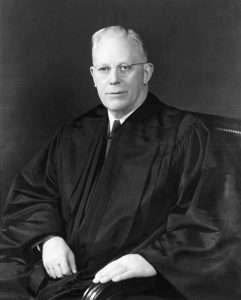The Volokh Conspiracy
Mostly law professors | Sometimes contrarian | Often libertarian | Always independent
Today in Supreme Court History: October 5, 1953
10/5/1953: Chief Justice Earl Warren takes the oath.

Editor's Note: We invite comments and request that they be civil and on-topic. We do not moderate or assume any responsibility for comments, which are owned by the readers who post them. Comments do not represent the views of Reason.com or Reason Foundation. We reserve the right to delete any comment for any reason at any time. Comments may only be edited within 5 minutes of posting. Report abuses.
Please to post comments


A dark day in US history.
Eisenhower later said it was the biggest mistake he made as President.
I would give him and his liberal colleagues credit for incorporating a large chunk of the Bill of Rights, though I would criticize most of the liberals for not having a consistent theory which would incorporate all of the B of R.
And Warren was willing to stand against government-sponsored racial discrimination, though the justices who frequently opposed him on other issues were on his side on this one (until they began to split apart on the issue of the state-action doctrine).
As I have mentioned, I don't fault him for preferring certain results as being more just than others, my criticism is that in many (though not all) cases he went further than the actual phrasing of the law would plausibly allow. When he took a vague term with different plausible interpretations, and chose a plausible interpretation which promoted justice, I'm fine with him.
"Warren was willing to stand against government-sponsored racial discrimination"
He wasn't as Governor!
"When he took a vague term with different plausible interpretations, and chose a plausible interpretation which promoted justice, I'm fine with him."
That is such a vague phrasing. What I feel promotes justice is just a moral opinion. You might as well say that when a plausible interpretation does what a judge likes, he should choose that one.
Miranda is a exemplar of Warren Court activism. No provision of the Constitution even arguably supports the idea that the government must inform you that you have a right to remain silent in police custody. Not one. Not even close.
The Constitution is anti-weasel. Tricking people into confessions is weasel.
You may be right, but are completely wrong.
The argument "we get to be weasels" is itself weasel.
There is no "trick" in the legal sense. When you get to the police station, just shut up. That is what the Constitution recognizes that you are allowed to do. It is not unconstitutional for the government to attempt to persuade you to waive any of your rights. Plea bargains would be clearly unconstitutional under that standard.
In any event, it is not applied generally. The police don't have to inform you that you are not required to consent to a search. The government does not have to send flyers telling you that you may purchase a gun, or to email the President if you disagree with his policies.
If they search w/o your consent (assuming no warrant, obviously), then the search is invalid. Consent requires permission; if they do it w/o asking, there is no consent.
Except nothing happens. No one gets punished. They find some other way of punishing their victim, and they do not return the confiscated contraband.
Right. They can ask you for permission to search. You say "yes" they can search. No requirement to tell you that you are free to refuse their request.
In the custodial interrogation process if they ask you questions and you answer, the answers are suppressed unless they read you the Miranda script telling you that you can refuse to answer questions.
A definite requirement to inform you of your rights--one that is not contained in the Constitution or any reasonable inference from it, and not required in other contexts.
The Constitution is nothing of the sort. It assumes people have the free agency to stand up for themselves. Miranda was how guilt-ridden statists appeased their own consciences.
There are many alternatives. For instance, every government intended their government schools to indoctrinate impressionable young minds in national values. Why not do that? Why not indoctrinate them in the freedom to tell cops to piss off, to tell legislators to piss off, that they had the freedom to do anything they wanted as long as they didn't harm anybody else? Why not have a domestic citizen's test which verifies that the candidates actually do know they don't have to talk to cops, and those that fail need nannies to hold their hands when crossing streets? We all know why, even those who don't want to admit it.
Miranda doesn't say that the government must inform you that you have a right to remain silent in police custody. (Indeed, only in Hollywood do people get read their Miranda warnings as they're being arrested.) Miranda says that a custodial confession cannot be deemed voluntary and thus cannot be introduced against you if you were unaware of your rights.
I should've phrased that as "a confession that was the result of custodial questioning," because a spontaneous custodial confession is admissible w/o Miranda.